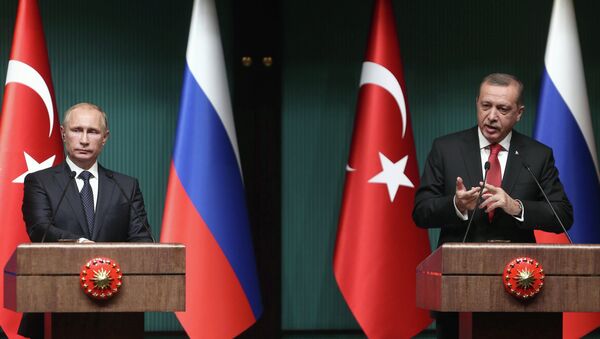Washington’s Failed Kurdish Gambit
The single largest event that made observers begin questioning whether Turkey was contemplating a pivot to Eurasia was the US’ failed attempt at using Kurdish nationalism to pressure Ankara into invading Syria. Truth be told, this is exactly what Turkey itself had spoken of doing in the past, but under its own conditions and with unquestionable guarantees from NATO and the GCC that they would support it in this endeavor. Washington, however, had other plans, and fanned the flames of Kurdish nationalism with the intent that this would scare Turkey enough into commencing a ‘humanitarian intervention’ in Syria’s Ayn al-Arab (Kobani in Kurdish), which would open the way for a more formal invasion of the country than had been stealthily proceeding for the past four years.
But, Turkey didn’t bite the bait for two reasons:
* It wanted concrete guarantees that NATO and the GCC would follow up with any military support that Turkey requested (which it never received from either);
and most importantly,
* It felt that the US’ bilateral engagement with ‘Kurdistan’ constituted an existential threat to the Turkish state.
Due to these two primary factors, Turkey began to take steps in doing what it had thought of for quite some time already, and that’s diversifying its foreign partnerships by more robustly reaching out to the non-Western world.
Thus far, this has meant closer cooperation with Russia (the feared ‘enemy’ of NATO, according to most Western pundits) through the so-called ‘Turk Stream’ pipeline, which is the replacement for the cancelled South Stream project. However, it isn’t just energy that attracts Turkey to Russia, since relations with Moscow offer more comprehensive benefits for Ankara if it decides to move towards a full strategic partnership. Here’s a glimpse of some fields where Turkey can profit:
Economics:
The Eurasian Union could provide a suitable enough replacement to Turkey’s stalled 30-year-long journey in joining the EU.
Politics:
Russia values sovereignty as a key pillar in international affairs, and thus won’t interfere with Turkey’s domestic politics.
Security:
While the US was double-dealing against Turkey by working with the Kurds and, as some in the country believe, supporting the Gezi Park protests (which could be structurally seen as a Color Revolution warm-up, no matter how popular and seemingly genuine they were), Turkey faces no such security risks from Russia.
Due to these reasons and more, Turkey’s leadership could be seriously persuaded to pivot towards Eurasia and away from the West.
On The Fence (As Planned?)
The current arrangement, however, sees Turkey sitting on the fence between both sides, which in some ways is a manifestation of multipolarity.
What is understood by this is that the country is playing all sides to its advantage, seeking to capitalize off of the competition for its allegiance and holding back from overly committing to one side or another.
It’s unknown how long Turkey can manage in this delicate balancing act before it’s compelled to more firmly take sides, but it’s worthy to discuss which of its interactions complicate deeper partnership with each of them in order to get a better picture of where it might be leaning:
Challenges With the West:
* Eurasian Union Talk:
The West is put off by the fact that Turkey has been talking with Russia about closer cooperation with the Eurasian Union, since if the two are successfully integrated, it would end Brussels’ ability to use the carrot of future EU membership as enticement in getting Ankara to do its bidding.
* ‘Turkish Stream’:
This strategic partnership completely destroyed the EU’s negotiating leverage in using South Stream as a weapon against Russia, and the West is extremely perturbed by Turkey assisting Russia in finding an alternative route for its energy exports.
* SCO Dialogue Partner:
The formal delineation of Turkey’s relationship with the non-Western institutional behemoth opens the way for closer ties to develop between Ankara and its new partners, which could pull the country even further away from its traditional allies with time.
Challenges With Eurasia (Russia):
* The War on Syria:
No matter how close Turkey moves towards Russia and the non-West, it still continues to be the prime external destabilizer in Syria through its role as a terrorist, weapons, and financial conduit supporting illegal regime change against the popular and democratically elected government there.
* NATO Infrastructure:
Even if Turkey decided to do away with the West and abandon NATO (either de-facto or de-jure), it would still have to contend with such obstacles as the US Air Force base in Incirlik (which some reports cite as secretly hosting nuclear weapons), making it unlikely that the US would peacefully abandon its positions without first resorting to some type of political subterfuge (i.e. Color Revolution) to reverse the decision.
* Neo-Ottomanism:
This ideological strain present in the minds of Turkey’s ruling elite (current Prime Minister Ahmet Davutoglu essentially invented it) means that the country will likely continue to behave in an aggressive manner towards its former sphere of influence in the Mideast and perhaps even the Balkans, thus making it a potential loose cannon that may not be geopolitically dependable as a close Russian partner.
Stepping away from the details and looking at the larger picture, Turkey’s challenges with the West are generally of a soft, asymmetrical nature, whereas the obstacles standing before its relations with Eurasia largely represent harder, more conventional interests.
While the West hasn’t proposed any relevant solutions for overcoming its difficulties with Turkey, Eurasia has, and it takes the form of Chinese missiles. Thus, if Ankara does in fact go ahead with the proposed deal to purchase Beijing’s anti-air armaments, it would represent a more tangible shift away from the West and closer to the Eurasia, which may symbolize the larger overall pivot possibly underway in the country’s geopolitical affairs.






